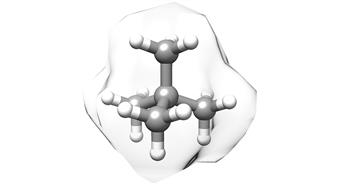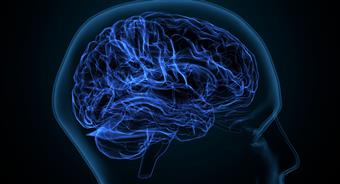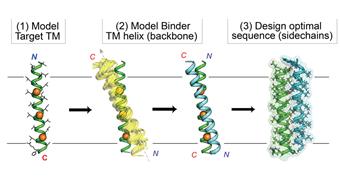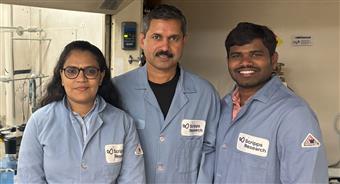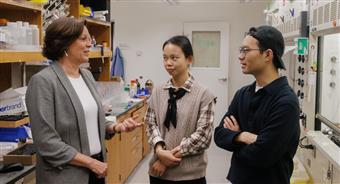
Scientist Q&A: What you need to know about the new hoppy beer study There's been a breakthrough in the science of beer. With growing evidence that molecules in hoppy beers can reduce weight and insulin resistance, a new Scripps Research study in Molecular Metabolism offers an explanation why.
We sat down with study leader Enrique Saez, PhD, associate professor, and Bernard Kok, PhD, research associate, to learn more.
September 25, 2018
What makes hoppy beers special?
Saez: Hoppy beers, like IPAs, contain compounds called isohumulones. These compounds seem to have health effects, so we decided to study how they interact with bitter taste receptors in the gut.
Wait taste receptors in the gut?
Saez: Yes! So, a lot of us were under the impression that taste receptors were only present in the mouth, but recent research shows that many other tissues express taste receptors, bitter taste receptors in particular.
These receptors are thought to perform different functions in different tissues. For example, bitter taste receptors in the mouth are there to tell us that a compound may be poisonous and we should avoid it. Not everything that's bitter is a poison, obviously, but that's what we think. It might be a defense mechanism that evolved to protect children from eating toxic plants until adults teach them which foods are safe.
In the gut, there is literature suggesting that bitter taste receptors control secretion of hormones that regulate your appetite and how quickly food moves down the intestinal tract. This could have developed as a mechanism to reduce the absorption of poisons.
And now we're wondering if this response might be manipulated pharmacologically. We show in this study that manipulating these receptors could have benefits for metabolic disease.
How did the new study work?
Saez: We worked with a molecule synthesized by a company called KinDex Pharmaceuticals. This was a synthetic version of isohumulone molecules found in hops that give beer its bitter flavor.
Studies in mice and people have shown that mixtures containing different isohumulones can have benefits for treating type 2 diabetes. But because we never had the isolated molecules, it was very difficult to figure out which isohumulones were working and how they worked.
The benefit of this synthetic isohumulone compound is that it's pure. It's a great tool for discovering new biology.
What happened when you gave this compound to the mice in your study?
Saez: The compound appeared to accelerate their metabolism, so they lost weight without eating less. Independent from the weight loss, the mice showed increased insulin sensitivity within four days. This happened because the compound activated a bitter taste receptor in the gut, which stimulated the secretion of hormones that talk to the brain and the pancreas.
Kok: Our paper shows that targeting bitter taste receptors in the intestine is probably a viable way to try to find new drugs to treat metabolic disorders such as obesity and diabetes.
Should people be drinking more hoppy beers for the health benefits?
Kok: Well, the one limitation of this study was that we couldn't study human intestines to see if they have the same bitter taste receptor that this pure compound activates in mice. Studies with isohumulone mixtures suggest that the receptor is there, but we can't yet be sure if our pure compound works the same way in humans. It's something that we are very interested in exploring.
It seems weird that there's still so much we don't know about the gut. What else would you want to study?
Saez: For this study, we focused on the secretion of a hormone called GLP1, which has benefits for glucose levels. But there's a lot more that we want to know. Activation of this receptor influences the release of several other hormones that are less studied. We'd like to know the roles of those hormones in remodeling metabolism.
Are you two IPA drinkers?
Saez: I am!
Kok: I'll drink them. The interesting thing about IPAs is that it's hard to overdrink. You tend to stop.
Saez: You feel full, and the hops are part of the reason. You get more of these isohumulone compounds, which we think make you feel full. That doesn't happen with lighter beers.
So your gut is telling your brain to stop?
Saez: Exactly. Your gut is talking to your brain!
Read more: The San Diego Union-Tribune -- Beers bitter delight is tasted in the gut
Molecular Medicine Saez, Enrique
More from Scripps
20/04/2024
New copper-catalyzed C-H activation strategy from Scripps Research Two-mode reactions inspired by human detox enzymes offer powerful new tools for drug discover...
12/04/2024
Scripps Research chemists devise easier new method for making a common type of building block for drugs Scientists transform simple linear amines into saturated...
06/04/2024
A simple, inexpensive way to make carbon atoms bind together A Scripps Research team uncovers a cost-effective method for producing quaternary carbon molecules,...
04/04/2024
Developing a vaccine for the zombie drug xylazine Scripps Research chemical biologists design an early proof-of-concept vaccine that could lead to the first...
30/03/2024
How blocking a neural receptor responsible for addiction could reduce alcohol use A Scripps Research team found that a new therapeutic that targets the kappa op...
13/03/2024
New computational strategy boosts the ability of drug designers to target proteins inside the membrane Customized-design approach could streamline the design of...
29/02/2024
Scripps Research scientists reveal how first cells could have formed on Earth New phospholipid discovery brings researchers closer to understanding how primordi...
29/02/2024
How molecular handedness emerged in early biology Scripps Research chemists fill a major gap in origin-of-life theories.
February 28, 2024
LA JOLLA, CA Mole...
22/02/2024
Snaking toward a universal antivenom Scripps Research scientists discovered antibodies that protect against a host of lethal snake venoms.
February 21, 2024
...
06/02/2024
Calibr-Skaggs announces expansion of option and license agreement with AbbVie to develop novel cell therapies for solid tumors and autoimmune diseases
AbbVie...
26/01/2024
Re-energizing mitochondria to treat Alzheimer's disease Scripps Research team restored neuron-to-neuron connections in human cells.
January 25, 2024
LA JO...
24/01/2024
100 years of Science Changing Life: Scripps Research celebrates a century of transforming human health For the last century, institute leaders and renowned scie...
23/01/2024
New technology lets researchers track brain cells' off switches The method could shed light on what goes awry in numerous brain conditions when neurons ar...
09/01/2024
Three decades of giving: Announcing the Calibr-Skaggs Institute for Innovative Medicines The ALSAM Foundation, founded by the Skaggs family, provides lasting g...
04/01/2024
Life science entrepreneur Gene Lay joins Scripps Research Board of Directors Lay, founder of the global biotech company BioLegend, brings invaluable experience ...
21/12/2023
Taming a plant-derived toxin Scripps Research team modifies the traditional poison picrotoxinin for potential neurological drugs and anti-parasite treatments. ...
19/12/2023
Scripps Research Executive Vice President Eric Topol gives TED talk on transformative power of AI in medicine Topol provides an overview of how AI models can i...
13/12/2023
New AI-powered algorithm could better assess people's risk of common heart condition Early detection of atrial fibrillation can reduce the risk of stroke an...
07/12/2023
Nanoparticle flu vaccine design shows promise in early tests Scripps Research-designed vaccine could provide broad, enduring protection against influenza A str...
16/11/2023
Numerous Scripps Research scientists named Highly Cited Researchers Clarivate's annual, global list represents researchers who have demonstrated significant...
07/11/2023
Multiple sclerosis drug invented at Scripps Research slows long-term devastating disease progression Late-breaking data reinforces the effectiveness and safety ...
05/10/2023
Keren Lasker named a 2023 Moore Inventor Fellow The prestigious award will support Lasker's inventive research in membraneless organelles and their applica...
22/09/2023
Michael Bollong named a 2023 Amgen Young Investigator The prestigious award will support Bollong's research identifying new molecular targets and therapeuti...
09/09/2023
Philip Dawson receives 2024 American Chemical Society National Award Dawson is honored with the Arthur C. Cope Late Careers Scholar Award for his foundational c...
07/09/2023
Scripps Research chemists devise a method for C-H activation of alcohols The method represents a new toolkit for making drugs and other compounds.
September 06...
31/08/2023
Scripps Research receives $1.5M to surveil infectious disease threats in wastewater Bill & Melinda Gates Foundation award to support the development of multi-pa...
16/08/2023
How cold temperatures trigger the brain to boost appetite Scripps Research scientists' discovery could lead to new weight loss and metabolic health treatmen...
08/08/2023
Human antibody that targets carfentanil, fentanyl and related opioids reverses overdose effects in preclinical study Scripps Research-developed antibody therapy...
04/08/2023
How sensory neurons impact the gut Scripps Research scientists show that the receptor PIEZO2 in sensory neurons controls gut motility and transit time, which a...
26/07/2023
AbbVie and Calibr Expand Strategic Collaboration to Advance Several Preclinical and Early-stage Clinical Assets The expanded strategic collaboration will advan...
23/07/2023
Scripps Research scientists develop AI-based tracking and early-warning system for viral pandemics Machine-learning system effectively predicts emergence of pro...
19/07/2023
Monitoring T cells may allow prevention of type 1 diabetes Scripps Research study shows that analyzing T cells in blood samples could be used to select at-risk ...
19/07/2023
Scripps Research mourns passing of leading organic chemist Albert Eschenmoser Eschenmoser pioneered key reactions in synthetic chemistry and shaped the understa...
15/06/2023
Scripps Research awarded $46.8 million by NIH to promote human health through innovative translational science and training The Translational Institute is harne...
13/06/2023
Scripps Research's Danielle Grotjahn named 2023 Pew Scholar in the Biomedical Sciences The award will support Grotjahn's study of how cells assemble the...
31/05/2023
Crossing the ring: new method enables C-H activation across saturated carbocycles Scripps Research chemists add another powerful tool to their molecular editin...
24/05/2023
Scripps Research develops behind-the-scenes tool for better biomedical data discovery The new resource makes datasets more discoverable for life science communi...
19/05/2023
Scripps Research neuroscientist Hollis Cline elected to American Academy of Arts and Sciences Cline is recognized for her discoveries about the role of sensory ...
19/05/2023
Scripps Research's Skaggs Graduate School awards doctoral degrees to 31st graduating class Commencement ceremony will be livestreamed via Zoom and on instit...
13/05/2023
A better route to benzocyclobutenes, sought-after building blocks for drugs Scripps Research chemists devise a new, C-H activation-based method for the synthesi...
09/05/2023
Renowned Scripps Research professor Jeffery Kelly elected to National Academy of Sciences Kelly's groundbreaking work on protein misfolding has led to thera...
28/04/2023
Mirror-image molecules pave new path for cancer drug discovery By comparing how mirror image versions of small molecules impact clusters of proteins, Scripps R...
22/04/2023
How alcohol consumption contributes to chronic pain A Scripps Research team showed how both alcohol intake and alcohol withdrawal can lead to increased pain and...
21/04/2023
Xin Jin receives dual awards to study autism risk genes in neurodevelopment Major grants from the National Institutes of Health and California Institute for Reg...
20/04/2023
Trim the sugar: New HIV vaccine design improves immune response Scripps Research vaccine candidate headed for clinical trials.
April 19, 2023
LA JOLLA, CA A...
18/04/2023
Therapeutic can seek and destroy potent opioid to treat overdoses Scripps Research chemists developed a new biologic to work against the synthetic opioid carfen...
07/03/2023
How heavy alcohol consumption increases brain inflammation The findings by a Scripps Research team point toward a potential new drug target for treating alcohol...
02/03/2023
Scientists find human antibodies that can block multiple coronaviruses including SARS-CoV-2 Results from a Scripps Research and UNC team pave the way for a vacc...
28/02/2023
$10 million grant funds Scripps Research Alcohol Research Center through its 50th year The five-year grant supports research into the neurobiology of alcohol us...
28/02/2023
Immune system drug shows promise in treating alcohol use disorder, a Scripps Research clinical trial reports Scientists at Scripps Research found that apremilas...
 Scientist Q&A: What you need to know about the new hoppy beer study There's been a breakthrough in the science of beer. With growing evidence that molecules in hoppy beers can reduce weight and insulin resistance, a new Scripps Research study in Molecular Metabolism offers an explanation why.
Scientist Q&A: What you need to know about the new hoppy beer study There's been a breakthrough in the science of beer. With growing evidence that molecules in hoppy beers can reduce weight and insulin resistance, a new Scripps Research study in Molecular Metabolism offers an explanation why.















